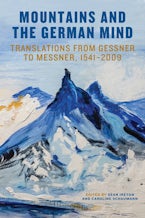
Title Details
290 Pages
22.8 x 15.2 cm
6 b/w illus.
Series: Studies in German Literature Linguistics and Culture
Series Vol. Number:
172
Imprint: Camden House
Mountain of Destiny
Nanga Parbat and Its Path into the German Imagination
- Description
- Contents
- Reviews
A study of how Nanga Parbat, the ninth-highest peak on earth, became the German "mountain of the mind."
Never has a mountain occupied the German imagination longer and more thoroughly than Nanga Parbat (8,125m), the world's ninth-highest peak, located in the extreme western part of the Himalaya chain in present-day Pakistan. Repeatedly referred to in the 1930s as the German "mountain of destiny," over a period of roughly two decades from 1932 to 1953 Nanga Parbat became not only the destination of six German mountaineering expeditions, but also the quintessential German "mountain of the mind" onto whose slopes German mountaineers, mountaineering officials, politicians, writers, and filmmakers projected some of the most pressing social, political, and cultural concerns of their times.This book is a detailed study of that process: of the initial motivations of post-First World War mountaineers for attempting to scale one of the tallest mountains in the world, of the appropriation of this epic mountaineering challenge by National Socialism, of the reappropriation of the Nanga Parbat project during the early years of the German Federal Republic. And most important - since to date such an approach is almost completely absent from existingstudies of Himalaya mountaineering of this era - it is a study of the means and mechanisms, the texts and contexts employed for communicating these high-altitude mountaineering exploits to the German public and thereby inscribingNanga Parbat into the German imagination.
Harald Höbusch is Associate Professor of German and Associate Chair of the Department of Modern and Classical Languages, Literatures and Cultures at the University of Kentucky.
Never has a mountain occupied the German imagination longer and more thoroughly than Nanga Parbat (8,125m), the world's ninth-highest peak, located in the extreme western part of the Himalaya chain in present-day Pakistan. Repeatedly referred to in the 1930s as the German "mountain of destiny," over a period of roughly two decades from 1932 to 1953 Nanga Parbat became not only the destination of six German mountaineering expeditions, but also the quintessential German "mountain of the mind" onto whose slopes German mountaineers, mountaineering officials, politicians, writers, and filmmakers projected some of the most pressing social, political, and cultural concerns of their times.This book is a detailed study of that process: of the initial motivations of post-First World War mountaineers for attempting to scale one of the tallest mountains in the world, of the appropriation of this epic mountaineering challenge by National Socialism, of the reappropriation of the Nanga Parbat project during the early years of the German Federal Republic. And most important - since to date such an approach is almost completely absent from existingstudies of Himalaya mountaineering of this era - it is a study of the means and mechanisms, the texts and contexts employed for communicating these high-altitude mountaineering exploits to the German public and thereby inscribingNanga Parbat into the German imagination.
Harald Höbusch is Associate Professor of German and Associate Chair of the Department of Modern and Classical Languages, Literatures and Cultures at the University of Kentucky.
Introduction
Between the Wars (1919-39)
The Postwar Years (1945-53)
Reading Defeat
Narrating Success
Hiding the Obvious
Seeing the Unseen
Conclusion
Notes
Bibliography
Index
Between the Wars (1919-39)
The Postwar Years (1945-53)
Reading Defeat
Narrating Success
Hiding the Obvious
Seeing the Unseen
Conclusion
Notes
Bibliography
Index
"Though the title suggests the book's common thread will be Nanga Parbat, in fact Höbusch has given us something far more wide-ranging. 'Mountain of Destiny' is a deeply sourced account of the co-development of mountaineering culture and Germany's modern self-identity, hinged around the rhetoric and trauma of National Socialism. . . . Students looking for introductory analyses of key primary sources in the history of mountaineering will find large parts of each chapter richly helpful." JOURNAL OF AUSTRIAN STUDIES
"Readers with interest in German mountaineering or film history will find value in the impressing amount of details the author presents." GERMAN HISTORY
"There is much to admire in Mountain of Destiny, a book that should take its place . . . as a classic of the intellectual history of mountaineering." COLLOQUIA GERMANICA
"'[A]bsorbing . . . . [W]ill naturally appeal to anyone interested in the history of mountaineering. It also offers an unusual perspective on some of the major themes of twentieth-century German history." JOURNAL OF EUROPEAN STUDIES
Hardcover
9781571139580
June 2016
£99.00 / $120.00
Ebook (EPDF)
9781782047063
June 2016
£24.99 / $29.95
Title Details
290 Pages
2.28 x 1.52 cm
6 b/w illus.
Series: Studies in German Literature Linguistics and Culture
Series Vol. Number:
172
Imprint: Camden House














